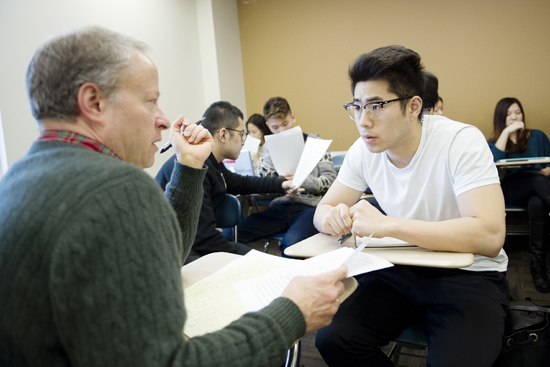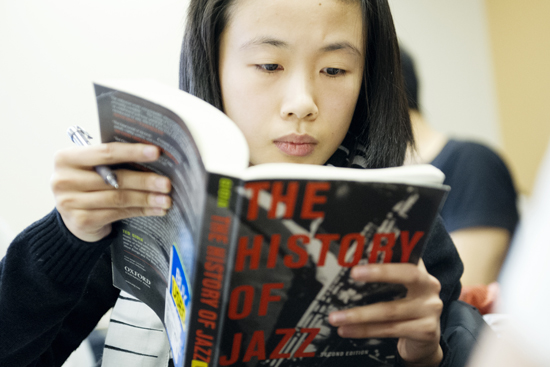It’s Got a Great Beat, and Helps with Your English
CAS jazz class uses music as gateway for nonnative speakers

Thomas Oller’s jazz class uses music as a universally accessible subject. Photo by Jackie Ricciardi
Class by class, lecture by lecture, question asked by question answered, an education is built. This is one of a series of visits to one class, on one day, in search of those building blocks at BU.
When Thomas Oller plays snippets of traditional African music, with thumping drum and pinging bells, in class, you might think, Oh, that’s interesting. When he plays bits of Roaring Twenties blues, influenced by African music, with Louis Armstrong’s trumpet mimicking the languorous wah-wah-wah of Bessie Smith’s singing, you think, Oh, that’s cool.
By the time Oller has you foot-tapping to the blues-cum-tango of Duke Ellington and Johnny Hodges, when he hits the off button you want to shout, Can we please hear the whole damn thing! Of course, that would be rude, and possibly distressing to the 16 students in this second-floor Mugar Memorial Library classroom, all nonnatives honing their English through the universal tongue of this most American of music.
Most courses don’t contain an exclamation point in their name, but Boston Jazz Now! earns its punctuation. Part of the Arts Now initiative of the College of Arts & Sciences Writing Program, Oller’s class for nonnative English speakers channels his passion into his profession. “I love jazz,” he says. “I want to share that love with as many people as I can.” (He plays clarinet and sax, but only “in the kitchen.”) Jazz makes a natural teacher’s aide for his students, the majority of whom are Chinese.

“If you play a piece of music, anybody can come up with a response to that, whether they’re speaking or writing in their native language or their second or third language,” says Oller, a CAS lecturer. No musical knowledge is required to take the class, and he keeps assignments flexible for students working to master English. “If you are less comfortable writing about something to do with music theory, then talk more about biography, talk more about history. Make a connection with the current events of the time when the music was being played—whether it’s the civil rights movement, or war, or depression.” Last semester, a student wrote about the clothes the musicians were wearing and how they differed from the formal clothes she was accustomed to in classical music. Oller says the paper led to an interesting discussion of “the culture that goes along with the music.”
Students practice their written English in essays analyzing the three jazz concerts they attend during the semester. They flex their speaking skills during small-group discussions of their readings (anchored by The History of Jazz) and in full-class discussions; a recent class focuses on a concert they’d attended the previous week by Flavio Lira, who spices traditional mournful Brazilian choro music with jazzy seasoning. New Orleans, of course, is jazz central; the “Boston” in Boston Jazz Now! refers to the class’ venue. But venue is vital, as the city’s jazz haunts expose students to a diversity of contemporary practitioners, such as Lira.

“You enjoyed it?” Oller asks a student about the Lira performance. “Somewhat? Tell the truth now,” he coaxes with a smile.
“I’m not, like, a pro on music,” says Angel Yanfei Wang (SMG’16), but “I was happy, enjoyable.” Another student describes the music as “more funky” than mournful.
“You got it there,” agrees Oller. “You sing the blues to get rid of the blues—if you’re feeling down, if you’re feeling the world stings. Nothing felt like a lament there.”
Oller says he encourages his charges to speak up, reminding them that when it comes to English, “they’re in a classroom where everybody is pretty much in the same situation, so they don’t need to feel shy, because it’s a safe environment.” The language barrier is plenty porous, he says, recalling a talk he once attended by a China-born statistician at Harvard.
“He speaks English as a second language, but by the time he was done…I wanted to sign up for statistics as a major. He was funny, he was engaging. His conversation was imperfect, but he compensated for it by speaking more slowly, by pausing before and after important concepts”—tricks that Oller passes on to his students.
Oller says he is encouraged by the progress he sees. In fact, he is grooming a graduate student to teach the class to both native speakers and ESL students, likely next fall.
This Series
Also in
One Class, One Day
-
November 30, 2018
Breaking Bad Director Gives CAS Class the Inside Dope
-
October 31, 2018
Trump and the Press: We’ve Been Here Before
-
August 3, 2018
A Scholarly Take on Superheroes

Comments & Discussion
Boston University moderates comments to facilitate an informed, substantive, civil conversation. Abusive, profane, self-promotional, misleading, incoherent or off-topic comments will be rejected. Moderators are staffed during regular business hours (EST) and can only accept comments written in English. Statistics or facts must include a citation or a link to the citation.